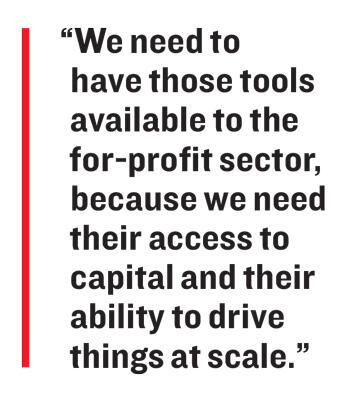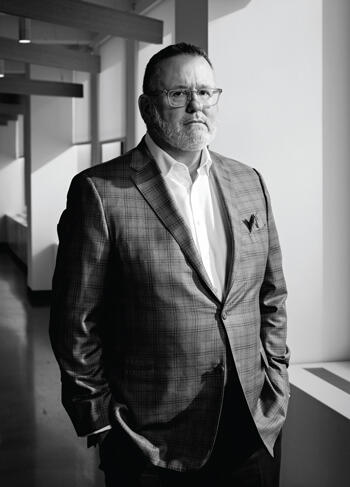When Rafael Cestero took the helm of the Community Preservation Corporation in 2012, he had never worked out a distressed loan portfolio or sold distressed assets. Nor did he have experience restructuring credit agreements.
But he had to learn quickly: The nonprofit was on the brink of bankruptcy, in part because it had taken risks on market-rate condo development — a stark departure from its founding mission to restore and create affordable housing. Cestero was charged with righting the group’s finances and steering CPC back to its initial goal.
A decade later, CPC bills itself as the nation’s largest federally certified lender focused on multifamily projects in low-income communities. To date, the nonprofit has dedicated more than $12 billion to finance the creation and preservation of more than 220,000 housing units, in New York and elsewhere. Last year, it invested nearly $1 billion in the space.
Cestero started his career in the 1990s as a project manager at low-income housing renovation nonprofit Enterprise Community Partners. He went on to serve as deputy commissioner of the New York City Department of Housing Preservation and Development, and then as commissioner, in the Bloomberg administration.
He recently stepped down from his role as CPC’s president, a job that will be assumed by Sadie McKeown. Cestero will remain CEO and focus on national expansion.
This interview has been condensed and edited for clarity.
Born: January 27, 1968
Hometown: Born in Philadelphia, grew up in Rochester, N.Y.
Family: Wife Karna and three children
 Both of your parents worked in the medical field. Do you think their careers influenced your own?
Both of your parents worked in the medical field. Do you think their careers influenced your own?
My dad was a kidney doctor, and he ran dialysis clinics all over the city of Rochester. What I didn’t realize as a kid was that he was opening clinics and delivering services in many of the same neighborhoods that CPC works in now and that I’ve spent my career working in. And my mom was a hospice nurse. So I just grew up around parents who were focused on using their profession to do good things in the community, not just earn a paycheck. That was a deep part of my upbringing, and I think a big part of why I ended up doing what I do.
What were you like as a kid?
A lot of energy, always moving. I always wanted to be outside, was very into sports, and I think I talked too much for my mother’s liking. I think I was a curious kid. I had two siblings, an older sister and a younger brother. Now, having three kids of my own and understanding what that’s like, I can imagine that sometimes it got a little exhausting. But at the end of the day, I think you want your kids to be curious about the world.
Did you have an “aha” moment that convinced you affordable housing was the path for you?
The thing that really got me was one of the projects that I was working on [at Enterprise] was a renovation of a vacant city-owned building, Deacon Juan Santos Plaza. It was for homeless families, most of which were moms with kids. And I got invited to the move-in. Being there, helping families move in, but also seeing the little kids who had never had an apartment of their own, never had a bedroom that they could call their own, really was a deeply moving experience for me.
This is a challenging space to be in. I imagine it feels like your job is never done.
The thing that I have always reminded myself of is that every project and every unit provides an opportunity for people who otherwise wouldn’t have access to housing that they could afford. And in 32 years, maybe we haven’t done enough, but I think we’ve done a lot. Because there are hundreds of thousands, if not more, families and individuals who have an affordable place to live that otherwise wouldn’t. My measuring stick has always been, what do I have to do to help one more household?
As HPD commissioner, you led an effort to convert vacant condos into affordable housing. Are there any takeaways from that initiative that could be applied to the state’s current push to convert distressed hotels and offices into residential space?
No crisis is ever the same. The thing that I learned the most was that the private market moves very quickly. We were willing to put up real subsidy dollars in order to get affordability in the finished projects. And there was some success, modest. It took too long to create the program, and so by the time the program was created, we were almost at the other end of the crisis. The other lesson is, we need to think about how you would incentivize owners of commercial buildings to convert them. Direct subsidy is probably the most cumbersome way to do it.
What do you consider your biggest professional accomplishment?
My wife and I recently celebrated our 25th wedding anniversary, and we went and spent a day in Brooklyn. We started our day in Williamsburg. I spent a lot of time and energy on the Greenpoint-Williamsburg rezoning that happened early in the Bloomberg administration. I also spent a lot of time and energy trying to figure out what the right solution was for the Domino Sugar site that CPC wasn’t going to be able to execute on. What that day really said to me is that all those efforts had been worth it, because what is happening there is really a truly New York experience. You’ve got lots of apartments, you’ve got lots of mixed-income development, and you’ve got a lot of public open space.
The second thing is, the trajectory of where CPC was when I started in 2012 — on the verge of bankruptcy — to where we are today.
 What was CPC like in those early days?
What was CPC like in those early days?
It was crazy, and it was chaotic, and it was not like anything that I had ever dealt with before. I mean, I’m an affordable housing guy. I’d had big jobs before. But this was different. This was an organization that was in distress, both from the perspective of the people that worked there, but also the financial underpinnings.
And what’s your biggest regret?
The biggest disappointment to me is not any one project or anything like that. It’s the fact that the community conversation around housing has become so toxic. It’s so angry, it’s name-calling, it’s finger-pointing, it’s challenging people’s motives. It’s really disappointing to me because when I first came to New York, there was this unbelievable energy around what are we going to do to save the neighborhoods that had been ravaged by disinvestment and decay during the ’70s and ’80s. Everybody was rowing in the same direction. And it’s just not that way anymore.
There has been a push to shift control of affordable housing to nonprofits, in the form of community land trusts and giving nonprofits the first opportunity to buy a rental building. Thoughts on those efforts?
We have a housing crisis in New York City, and at a time of crisis, you don’t limit the tools in your toolbox. CPC financed one of, if not the first, community land trust deals in East Harlem with HPD. It’s definitely a tool we should be using. But we shouldn’t do it at the expense of other things. We need more of everything. We need more tools that lend themselves to supporting the great nonprofits that we have in New York. But we need to have those tools available to the for-profit sector, because we need their access to capital and their ability to drive things at scale.
What would you like your children to learn from you?
In a professional sense, to care about what you do. Decide what it is that you’re passionate about, and that will propel you forward.
And on a personal note, my wife and I have said this to our kids many times, that the single most important thing to us is that they’re good people, that they care about others and that they try to use their time here to help other people.
Do you have any hobbies?
You’re talking to a wounded, lifelong, die-hard Buffalo Bills fan. And my wife and I love to be out on a boat, on a lake. We’re lucky enough to have a place in the Finger Lakes, where I used to go as a kid. We spend a lot of time there. And I love to cook. Cooking helps fuel the creative side of my brain.
The renewal of the 421a tax break is often cited as key to funding affordable housing. What do you think of the governor’s proposal to replace the program?
Rental housing that is not subsidized does not get built in the city without some kind of tax incentive, given our current property structure in New York. There are a lot of people that say, “Well, what we should really do is fix the property tax structure.” And that could certainly be a path to take, but that’s going to take a while. And we need more rental housing now. The vast majority of 421a projects are in small buildings. CPC alone, since 2016, has financed 24 individual projects around the city, [most of which had] less than 30 units [each], that have been created because of their ability to use the 421a program. I was really happy that the governor decided to take a stand on this. I think she understands the importance of rental housing and understands the importance of being able to make that happen. I think we can all agree that the iteration of 421a in 2016 can use some tweaking, and we should make it more aligned with what the city’s goals are, but we need something. And that’s just the basic fact.
You live in Westfield, New Jersey, now. Are you near the “Westfield Watcher” house, where the owners received those threatening letters?
It’s one block over. It was the talk of the community for a very long time, but it didn’t have any real impact on us. There’s a new owner in that house now, and it’s a beautiful house. We have two dogs, and my wife and I would go on walks with them, and it was one of those houses that you go, “Wow, wouldn’t it be great to live in that house?” And then it became the Watcher house.
Do you have a favorite bagel place in New Jersey that rivals your favorite place in New York?
I have to say that New Jersey gets a very bad rap when it comes to bagels and pizza. My favorite bagel place is the Bagel Chateau here in Westfield. And I do think that it rivals the best bagels in New York. But I’m not going to get into a full-on debate on the topic. One funny thing is that my oldest son came to work with me, and we went across the street from my office to the deli to get a breakfast sandwich. He walked up to the counter and ordered a Taylor Ham, egg and cheese, and the deli guy in New York City looked at him like he had eight heads, and I said, “Oh, no, no, no, you can’t get that here. That’s only in New Jersey.” And he was like, “What?” I was like, “Yeah, just get a bacon, egg and cheese. It’s fine.”
